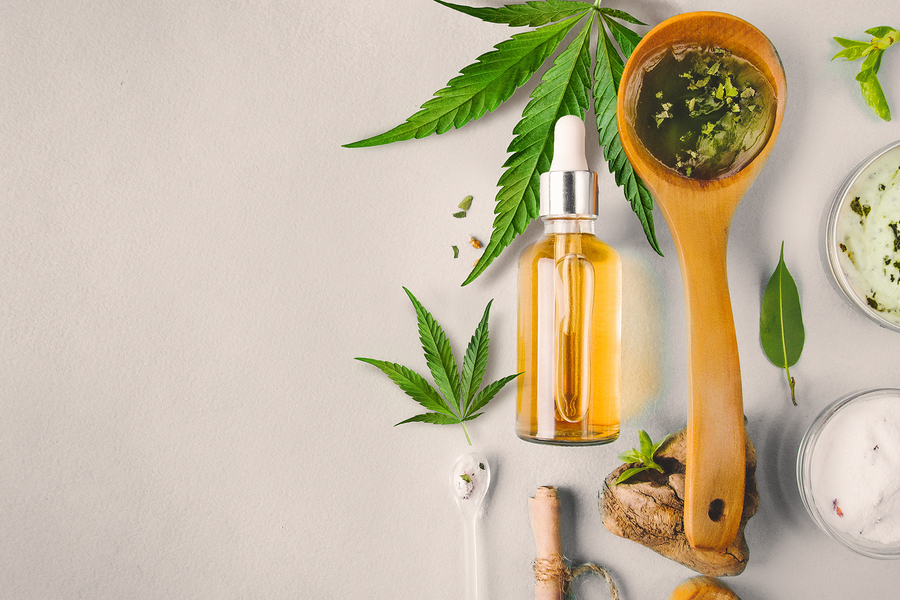If it seems like almost everyone you know uses CBD products to manage stress, well, that’s probably the case. CBD is a flourishing growth market, which The New York Times reports will reach $16 billion by 2025 in the United States. That figure isn’t surprising, given the plethora of CBD products in the marketplace that range from face creams to gummy candies. But should you be using CBD? Before deciding, you should know more about it, as well as the potential benefits and side effects.
What is CBD?
CBD is more formally known as cannabidiol, which is one of the two primary active ingredients (along with tetrahydrocannabinol, or THC) in marijuana. Both CBD and THC are considered cannabinoids, and there are close to 200 of them in marijuana. However, unlike THC, CBD can be derived from hemp as well as marijuana, and it doesn’t alter brain function like THC and other cannabinoids. Essentially, CBD won’t get you high.
A market for CBD products was basically created with the federal Agriculture Improvement Act of 2018, also called the Farm Bill. This legislation moved cannabis and its byproducts such as CBD off the national Controlled Substances List as long as the resulting products have a very low percentage of THC, less than 0.3%. Because hemp naturally has this low amount of THC, it is often used as a source for CBD products.
The CBD compound appears to have a calming, relaxing effect, which is why it’s been touted as helpful for all kinds of medical conditions. However, research on CBD is limited, and the U.S. Food and Drug Administration has only approved one CBD product, a prescription medication to help children with rare epilepsy disorders. Because the CBD market is relatively new, you need to be careful about the products you use. Your health care provider may be able to guide in this regard, especially when it comes to dosage level and how CBD would fit in your overall medical care plan.
CBD and Stress
Another factor that may explain CBD’s popularity is that it’s often used to reduce stress, and plenty of people nowadays lead stressful lives. According to a survey conducted by cannabis research and marketing firm the Brightfield Group, almost 70% of respondents say they use CBD to soothe anxiety. In addition, CBD may help relax people who have insomnia or other sleep disorders. This is important because a lack of sleep can exacerbate anxiety symptoms; conversely, when you’re anxious, you don’t sleep well. It’s a vicious circle, and it’s one many people try to escape with CBD.
Initial studies show promise for the ability of CBD to reduce stress and anxiety. In addition to the research into CBD and sleep, another study found that CBD reduced anxiety for people with seasonal affective disorder (SAD) when taken orally. The study’s authors, as well as other researchers, also suggested CBD may help with post traumatic stress disorder (PTSD) and noted there was preliminary evidence that CBD may be beneficial for generalized anxiety disorder, obsessive-compulsive disorder (OCD), and panic disorder. Studies on this topic encourage further research to determine just how effective CBD may be for stress.
In the meantime, people trying to ease stress typically take CBD orally, in tablets or oils. It can also be purchased in creams or lotions. If you want to take CBD for anxiety, it’s advised that you speak with your health care provider to find the right initial dose; the doctor can make a note of it in your patient records along with any other supplements or medications you are taking.
CBD Benefits and Side Effects of Oil-Based Products
As mentioned before, there is an FDA-approved use for CBD in the form of Epidiolex, the prescription medicine for pediatric epilepsy. Epidiolex has helped reduce, and sometimes eliminate, seizure episodes in children suffering from Lennox-Gastaut syndrome, Dravet syndrome, and similar disorders.
There is also some limited evidence that CBD may be suitable for easing chronic pain and inflammation triggered by conditions such as arthritis and neuropathy. Again, much more research needs to be done to determine CBD’s actual effectiveness in these cases.
Research that has been done so far indicates CBD’s side effects are rather limited. Perhaps the strongest cautionary note has come from the FDA, which has issued a warning that CBD oil products can potentially injure the liver. People taking CBD oil may feel queasy or nauseous, irritable, or overly tired. People on blood thinners also should be cautious about using CBD, as it can increase levels of those medications in the body. CBD should not be used with alcohol or medications for certain mental health disorders such as anxiety or panic attacks, as those combinations can affect the brain and cause excessive drowsiness. Plus, there is a risk that with unregulated CBD supplements, and you may not know exactly what you’re getting, which is another reason why you should discuss potential CDB use with a health care professional.
If you have questions about CBD or are worried about managing stress or anxiety, contact Aspire Regenerative. We offer ELEVARx® CBD products, which are water soluble and synthesized into nanoparticles for maximum absorption in the body. This innovative product line is also vegan, gluten free, hemp derived, and free of GMOs.
At Aspire Regenerative, we can use CBD and many innovative therapies in regenerative medicine to develop individualized treatment plans that rejuvenate the body’s tissues and bolster your overall wellness. We offer a comprehensive range of services, including several targeting psychiatric and neurological conditions. Talk to us today to learn more about how regenerative medicine can help you.

